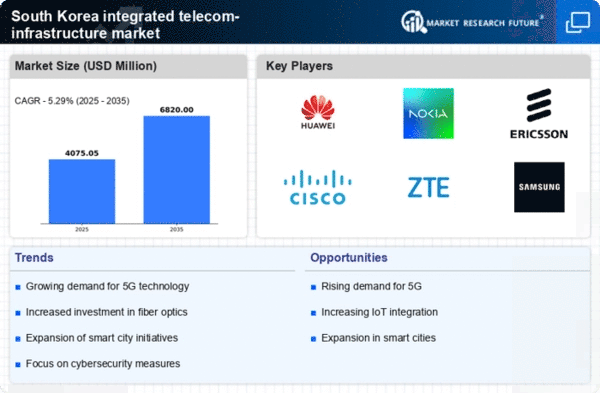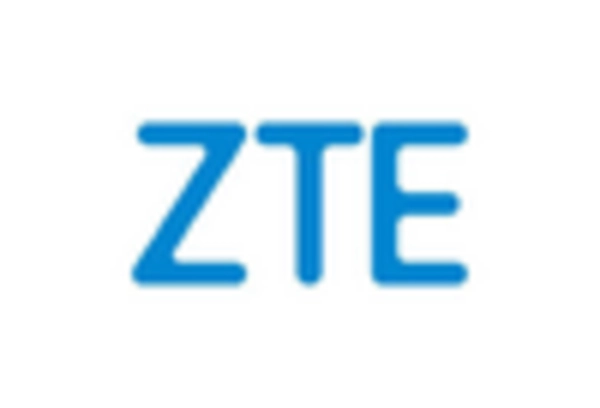Emergence of Smart Technologies
The emergence of smart technologies is significantly influencing the integrated telecom-infrastructure market in South Korea. As smart cities evolve, the demand for integrated solutions that connect various services, such as transportation, energy, and public safety, is increasing. By 2025, it is projected that smart city initiatives will require an investment of approximately $2 billion in telecom infrastructure to support the necessary connectivity. This trend indicates a shift towards more integrated systems that rely on advanced telecom solutions. Consequently, telecom providers are likely to focus on developing infrastructure that can support these smart technologies, thereby driving growth in the integrated telecom-infrastructure market.
Adoption of Cloud-Based Solutions
The adoption of cloud-based solutions is transforming the integrated telecom-infrastructure market in South Korea. Businesses are increasingly migrating to cloud platforms to enhance operational efficiency and reduce costs. This shift is expected to drive demand for telecom infrastructure that supports cloud services, with projections indicating a growth rate of 15% in cloud-related telecom services by 2025. As companies seek to leverage the benefits of cloud computing, telecom providers are likely to invest in integrated solutions that facilitate seamless connectivity and data management. This trend underscores the importance of adaptable and scalable telecom infrastructure, which is essential for meeting the evolving needs of businesses in a digital landscape.
Government Initiatives and Support
Government initiatives play a crucial role in shaping the integrated telecom-infrastructure market in South Korea. The South Korean government has been actively promoting digital transformation through various policies and funding programs. For instance, the government allocated over $1 billion in 2025 to support the development of advanced telecom infrastructure, including 5G networks and fiber-optic installations. Such initiatives not only enhance the quality of telecom services but also stimulate competition among service providers. This competitive environment encourages innovation and investment in integrated telecom solutions, thereby driving market growth. The government's commitment to fostering a digital economy is expected to further bolster the integrated telecom-infrastructure market.
Rising Demand for High-Speed Connectivity
The increasing demand for high-speed connectivity in South Korea is a primary driver for the integrated telecom-infrastructure market. With the proliferation of smart devices and the Internet of Things (IoT), consumers and businesses alike require robust and reliable internet services. As of 2025, approximately 90% of households in South Korea are expected to have access to high-speed internet, which necessitates significant investments in telecom infrastructure. This demand is further fueled by the growing trend of remote work and online services, compelling telecom providers to enhance their infrastructure capabilities. Consequently, the integrated telecom-infrastructure market is likely to experience substantial growth as companies strive to meet these connectivity needs.
Increased Focus on Data Privacy and Security
In the context of the integrated telecom-infrastructure market, the heightened focus on data privacy and security is becoming increasingly relevant. As cyber threats evolve, telecom companies in South Korea are compelled to invest in secure infrastructure to protect sensitive data. In 2025, it is estimated that spending on cybersecurity solutions within the telecom sector will reach $500 million, reflecting the industry's commitment to safeguarding user information. This emphasis on security not only enhances consumer trust but also drives the demand for integrated telecom solutions that prioritize data protection. As a result, the integrated telecom-infrastructure market is likely to benefit from this growing focus on security measures.
















